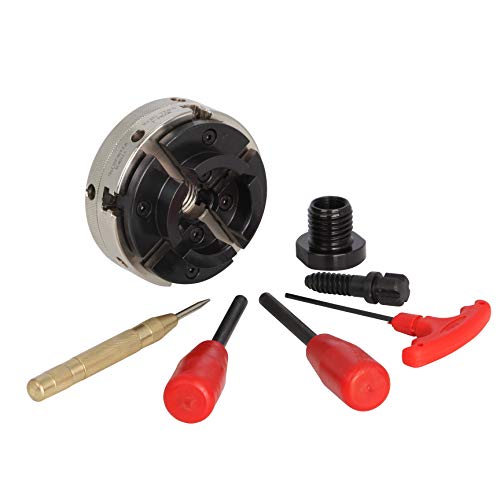You’ll find that choosing the right 4 jaw chuck for your wood lathe can make or break your woodturning projects. Whether you’re crafting bowls, platters, or decorative pieces, the chuck’s quality directly impacts your work’s precision and finish. From self-centering designs to versatile jaw options, today’s market offers several impressive choices. Let’s examine five top performers that’ll help you achieve professional-level results in your workshop.
4 Inch Wood Lathe Chuck Set with Self-Centering 4 Jaw
The versatile 4 Inch Wood Lathe Chuck Set is an ideal choice for woodturners who need flexibility in their projects. With its self-centering 4-jaw design, you’ll be able to handle both round and square workpieces up to 4 inches in diameter.
This chuck features a blackened surface to resist rust and comes with two thread options: 1 x 8 TPI and 3/4 x 16 TPI adapter. You’ll find the quick mounting system convenient, while the reversible jaws offer expanded clamping capabilities. At 4.55 pounds, it’s sturdy enough for larger diameter work, though you’ll want to exercise caution when working with pieces that extend beyond the chuck edge.
Best For: Woodturning enthusiasts and hobbyists who need a versatile chuck for handling both round and square workpieces up to 4 inches in diameter.
Pros:
- Self-centering 4-jaw design allows for quick and balanced workpiece mounting
- Includes both 1 x 8 TPI and 3/4 x 16 TPI adapter options for broad compatibility
- Rust-resistant blackened surface treatment reduces maintenance needs
Cons:
- Some users report inconsistent grip alignment and clamping issues
- Build quality may not match higher-end brand-name alternatives
- Safety concerns when working with pieces that extend beyond chuck edge
Wood Lathe Chuck Set 4-Jaw Self Centering (5PCS Jaws)
Woodturners seeking versatility will appreciate DEEFIINE’s nickel-plated scroll chuck set, which comes with five interchangeable jaws and a large plate jaw. The 4-inch chuck features CNC-processed parts for stability and a 1×8 TPI thread mount. You’ll find everything neatly organized in a black toolbox, including a tightening gear key, T-Allen wrench, and screw chuck.
While hobbyists praise its value compared to premium brands, you should note some minor concerns about runout and rough jaw edges. The nickel plating resists rust in humid conditions, making it a practical choice for your workshop. At 11.16 pounds, it’s a substantial tool that’s earned a 4.6-star rating from users.
Best For: Beginner to intermediate woodturners seeking a versatile, budget-friendly chuck set that offers multiple jaw options for different turning projects.
Pros:
- Comprehensive kit includes 5 jaws and accessories in a portable storage box
- Nickel-plated finish provides good rust resistance
- Excellent value compared to premium chuck brands
Cons:
- Some users report minor runout issues
- Rough edges on jaws may need finishing
- Jaw adjustment holes reported to be somewhat loose
Wood Lathe Chuck Set 4″ with Self Centering 4 Jaw (1×8 tpi)
Delivering impressive versatility for hobbyist woodworkers, DEEFIINE’s 4-inch self-centering chuck set stands out with its nickel-plated, rust-resistant construction and extensive accessory package. The set includes round jaws, big round jaws, and a screw chuck, making it adaptable for various turning projects.
While not a precision tool, this 6.45-pound chuck offers reliable performance with CNC-processed components and dual thread compatibility (1×8 tpi and 3/4×16 tpi). Users praise its easy jaw changes and effective wood grip, though you’ll need minor adjustments to minimize runout for best results.
Best For: Hobbyist woodworkers and DIY enthusiasts seeking a versatile, entry-level chuck for small to medium turning projects.
Pros:
- Comprehensive accessory package includes multiple jaw sets and adapters
- Nickel-plated, rust-resistant construction for longevity
- Easy jaw changes and good grip strength for most wood applications
Cons:
- Some runout issues require adjustment for precision work
- Not suitable for professional or high-precision projects
- Relatively heavy at 6.45 pounds, which may affect lathe balance
4 Inch Wood Lathe Chuck Set with Self-Centering 4 Jaw
For versatile woodturning projects, this self-centering 4-inch chuck set stands out with its dual threading compatibility and anti-rust construction. You’ll appreciate its 1×8 TPI thread and included 3/4×16 TPI adapter, making it suitable for various lathe types.
The CNC-machined components deliver stable performance while resisting rust, ensuring long-term reliability. You get everything needed to start turning: chuck body, round jaws, tightening gear key, T-Allen wrench, and a 3/8″ wood screw. The jaws’ ability to both clamp and expand adds flexibility to your projects, and you can expand capabilities with additional jaw sets from SIIIXS.
Best For: Woodturners seeking a versatile, rust-resistant chuck that works with multiple lathe thread sizes and offers expandable functionality through additional jaw sets.
Pros:
- Dual threading compatibility (1×8 TPI and 3/4×16 TPI) increases versatility
- Anti-rust construction and CNC-machined parts ensure longevity
- Complete kit includes all essential components for immediate use
Cons:
- Additional jaw sets must be purchased separately
- Limited to 4-inch diameter workpieces
- May be overkill for casual or beginner woodturners
4INCH 4-Jaw Self-Centering Wood Lathe Chuck (SCR4-4)
The precision-engineered INCH 4-Jaw Self-Centering Wood Lathe Chuck (SCR4-4) stands out as a versatile powerhouse for both novice and experienced woodturners. You’ll appreciate its high-grade K1045 steel construction with electric nickel plating that prevents rust and guarantees durability.
The chuck’s impressive capacity handles workpieces from 1-1/2 to 3 inches internally and pilot holes from 2 to 3-5/8 inches externally. It’s compatible with major brands like Jet, Rikon, and Delta, while working seamlessly with VINWOX accessories. The self-locking system delivers a firm grip, and its precision-machined guides provide exceptional stability. With thread sizes of 1x8TPI and 3/4x16TPI, you’re equipped for various wood projects, from bowls to vases.
Best For: Woodturning enthusiasts and hobbyists seeking a reliable, versatile chuck for creating bowls, vases, and cups on mini to heavy-duty wood lathes.
Pros:
- High-quality construction with K1045 steel and nickel plating for durability and rust resistance
- Versatile compatibility with major lathe brands and broad range of workpiece sizes
- Self-centering design with precision-machined guides for stable, accurate turning
Cons:
- Relatively heavy at 6.57 pounds, which may be cumbersome for some users
- Limited to 14-inch swing capacity, restricting larger project possibilities
- Higher price point compared to basic chuck options
Factors to Consider When Choosing a 4 Jaw Chuck for Wood Lathe
When you’re selecting a 4-jaw chuck for your wood lathe, you’ll need to check several critical features to guarantee you’re making the right investment. You should verify the thread size matches your lathe’s spindle, examine the chuck’s construction quality and materials, and evaluate the jaw design for smooth movement and secure grip. The maximum workpiece capacity and included accessories, such as mounting adapters, will determine the chuck’s versatility for your specific woodturning projects.
Thread Size Compatibility
Selecting the right thread size stands as an essential factor when choosing a 4 jaw chuck for your wood lathe. You’ll typically encounter two common thread sizes: 1 x 8 TPI and 3/4 x 16 TPI. It’s important to verify your lathe’s specifications before making a purchase to guarantee proper compatibility.
Many modern 4 jaw chucks come with adapters that let you use them on lathes with different thread sizes. This feature is particularly valuable if you own multiple lathes or plan to upgrade in the future. Keep in mind that the thread size impacts the chuck’s gripping capability, with larger diameters often providing better stability for bigger workpieces. Don’t risk using an incompatible thread size, as this can damage both your chuck and lathe while creating unsafe turning conditions.
Build Quality and Materials
Beyond proper thread sizing, build quality and material selection shape the long-term performance of your 4 jaw chuck. You’ll want to look for high-grade materials like K1045 steel with nickel plating, which offers superior durability and rust resistance in woodturning environments.
CNC-processed components deliver better stability and precision, helping prevent jaw misalignment during your turning projects. Check the chuck’s weight, as heavier models often indicate higher-quality, denser materials that provide enhanced stability during operation. The jaws should be robust and versatile enough to grip various workpiece sizes up to 4 inches effectively. Don’t overlook the finish quality – proper plating treatments like blackened or nickel coating will protect your investment from corrosion, especially if you’re working in humid conditions.
Jaw Design and Movement
The jaw design and movement mechanism of a 4 jaw chuck directly impacts its versatility and efficiency in woodturning projects. You’ll want to look for chucks that offer both positive and negative jaw mounting options, giving you flexibility to work with various workpiece shapes and sizes.
Consider whether you need a self-centering chuck for primarily round objects or an independent chuck for irregular shapes. The scroll mechanism’s smoothness is essential, as it controls how easily you can adjust all jaws simultaneously. Pay attention to the jaw profile type – dovetail jaws provide superior grip for most turning projects, while flat jaws might be better for specific applications.
Don’t forget to check the chuck’s maximum jaw capacity to guarantee it’ll accommodate your intended workpiece sizes.
Maximum Workpiece Capacity
When choosing a 4 jaw chuck, understanding its maximum workpiece capacity is essential for your woodturning projects. Most standard 4 jaw chucks can handle workpieces between 1.5 to 4 inches in diameter, but you’ll need to check your specific model’s specifications.
You’ll want to take into account both internal and external jaw capabilities when evaluating a chuck’s capacity. The jaw design, whether dovetail or straight, will affect how effectively you can grip different sizes and shapes of materials. For larger workpieces, you’ll need to confirm your chuck provides adequate gripping strength and stability.
Remember to properly adjust and align your chuck for each project. This maximizes its holding capacity and guarantees your workpiece remains secure throughout the turning process, regardless of its size.
Included Accessories and Adapters
Essential accessories and adapters bundled with your 4 jaw chuck can greatly impact its versatility and ease of use. You’ll want to verify that the chuck includes adapters for common thread sizes like 1×8 TPI and 3/4×16 TPI to guarantee it’ll fit your lathe properly.
Look for packages that come with necessary tools like tightening gear keys and T-Allen wrenches, which you’ll need for setup and adjustments. Some manufacturers include additional plate jaws for handling larger workpieces, expanding your chuck’s capabilities. A storage solution, such as a toolbox, helps keep all components organized and protected. Before making your final choice, check if the manufacturer offers extra jaws and accessories you might need for future specialized projects.
Mounting System Security
Safety and performance hinge on a secure mounting system when selecting a 4 jaw chuck for your wood lathe. You’ll need to verify the chuck’s thread size matches your lathe’s spindle perfectly – typically 1 x 8 TPI or 3/4 x 16 TPI with an adapter. Don’t compromise on this vital compatibility.
Look for a self-centering mechanism that delivers consistent clamping force around your workpiece. This feature helps maintain proper alignment and reduces unwanted vibration during turning. You’ll also want to check the jaw’s gripping power and self-locking capabilities, especially if you’re working with larger pieces. Remember to maintain your chuck’s mounting system regularly by cleaning the components and checking for wear. This maintenance routine will guarantee reliable performance and extend your chuck’s lifespan.







